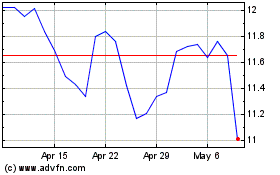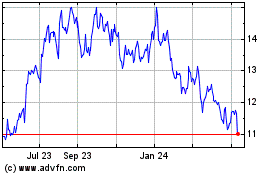Dynavax Technologies Corporation (NASDAQ: DVAX), a
biopharmaceutical company focused on developing and commercializing
novel vaccines, and the Icahn School of Medicine at Mount Sinai
(“Mount Sinai”) today announced they have entered into a
collaboration to develop a universal influenza (flu) vaccine. Mount
Sinai’s current work in this area is funded under a contract award
from the National Institute of Allergy and Infectious Diseases
(NIAID) of the National Institutes of Health (NIH), as part of the
Collaborative Influenza Vaccine Innovation Centers (CIVICs) program
established by NIAID. The Mount Sinai CIVICs team will
evaluate a novel approach they have developed called chimeric
hemagglutinin (cHA) designed to protect against all strains of
influenza in combination with Dynavax’s CpG 1018TM adjuvant.
The development program will support an
Investigational New Drug (IND) application for Phase I clinical
trials. Drs. Peter Palese, PhD, Professor and Chair of the
Department of Microbiology at Mount Sinai, Adolfo-Garcia-Sastre,
PhD, Director of the Global Health and Emerging Pathogens
Institute, and the Irene and Dr. Arthur M. Fishberg Professor of
Microbiology and Medicine (Infectious Diseases) at Mount Sinai, and
Florian Krammer, PhD, Professor of Microbiology at Mount Sinai will
be leading the development of the program.
There are no approved universal flu
vaccines. The effectiveness of seasonal influenza vaccine
ranges between 10% and 60%. A universal vaccine could eliminate the
need to update and administer the seasonal flu vaccine annually and
could protect against newly emerging flu strains, potentially
including those that could cause a flu pandemic.
“We are focused on designing novel vaccine
candidates and delivery platforms with an emphasis on
cross-protective vaccine strategies that could be used in healthy
adults as well as populations at high risk for the most serious
outcomes of influenza, such as children, older adults, and pregnant
women,” said Peter Palese, PhD, Professor and Chair of the
Department of Microbiology at the Icahn School of Medicine at Mount
Sinai. “Including CpG 1018 in these vaccines gives us an important
tool to potentially improve the immune response, especially in
populations that need it most like the elderly.”
“We are excited to partner with Mount Sinai on
this important vaccine development effort that has the potential to
significantly reduce the morbidity and mortality caused by
influenza viruses every year,” commented Ryan Spencer, Chief
Executive Officer of Dynavax. “Having seen the benefit of
incorporating CpG 1018 in our first commercial vaccine, we believe
it has significant potential to enhance the immune response in a
universal flu vaccine. This effort directly aligns with Dynavax’s
goal to leverage the value of CpG 1018 across multiple diseases and
vaccine approaches through collaborations with world class
researchers like Mount Sinai.”
“Drs. Palese, Garcia-Sastre and Krammer are key
global opinion leaders in virology. Their collective research
programs have resulted in technologies that support the development
of a universal flu vaccine,” said Erik Lium, PhD, Executive Vice
President and Chief Commercial Innovation Officer at Mount Sinai.
“In collaboration with Dynavax, we look forward to advancing these
technologies to create an effective vaccine that can reduce the 3-5
million severe cases of influenza each year.”
Influenza is a contagious respiratory illness
caused by influenza viruses. It can cause mild to severe illness.
Serious outcomes of flu infection can result in hospitalization or
death. Some people, such as older people, young children, and
people with certain health conditions, are at high risk of serious
flu complications. There are 2 epidemiological forms of
influenza, seasonal and pandemic. Seasonal influenza epidemics,
caused by influenza A and B viruses, result in 3–5 million severe
cases and 300 000–500 000 deaths globally each year. Influenza
pandemics caused by influenza A virus emerge at unpredictable
intervals. They cause significantly increased morbidity and
mortality, compared with seasonal influenza.
The U.S. Centers for Disease Control (CDC)
annually estimates the burden of flu to the U.S. health
system. CDC estimates that the burden of illness during the
2018–2019 season included an estimated 35.5 million people getting
sick with influenza, 16.5 million people going to a health care
provider for their illness, 490,600 hospitalizations, and 34,200
deaths from influenza.
About Vaccine AdjuvantsAn
adjuvant is a pharmacological or immunological agent that modifies
the effect of other agents. Adjuvants are added to a vaccine to
boost the immune response to produce more antibodies and
longer-lasting immunity, thus minimizing the dose of antigen
needed. Adjuvants may also be used to enhance the efficacy of a
vaccine by helping to modify the immune response by particular
types of immune system cells.
About CpG 1018 AdjuvantCpG 1018
is the adjuvant used in HEPLISAV-B® [Hepatitis B Vaccine
(Recombinant), Adjuvanted], an adult hepatitis B vaccine approved
by the U.S. Food and Drug Administration (FDA). Dynavax developed
CpG 1018 to provide an increased vaccine immune response, which has
been demonstrated in HEPLISAV-B. In pre-clinical and clinical
studies, results demonstrated that the addition of CpG 1018
increases antibody concentrations, stimulates helper (CD4+) and
cytotoxic (CD8+) T cell populations and generates robust T and B
cell memory responses. Additionally, CpG 1018 strongly favors
development of the Th1 subset of helper T cells, the type of helper
T cell that is essential for protection from infections with
viruses and intracellular bacteria. CpG 1018 targets a single, well
defined receptor (TLR9) expressed on only a few key cell types and
the mechanisms of action as an adjuvant are quite well
understood. CpG 1018 provides a well- developed technology
and a significant safety database, potentially accelerating the
development and large-scale manufacturing of a COVID-19
vaccine. Upon completion of on-going scale up activities, the
existing equipment capacity for CpG 1018 will be 600 million to 1.2
billion adjuvant doses annually, depending on final dose
selected.
About the Mount Sinai Health
SystemThe Mount Sinai Health System is New York City's
largest academic medical system, encompassing eight hospitals, a
leading medical school, and a vast network of ambulatory practices
throughout the greater New York region. Mount Sinai is a national
and international source of unrivaled education, translational
research and discovery, and collaborative clinical leadership
ensuring that we deliver the highest quality care—from prevention
to treatment of the most serious and complex human diseases. The
Health System includes more than 7,200 physicians and features a
robust and continually expanding network of multispecialty
services, including more than 400 ambulatory practice locations
throughout the five boroughs of New York City, Westchester, and
Long Island. The Mount Sinai Hospital is ranked No. 14 on U.S.
News & World Report's "Honor Roll" of the Top 20 Best
Hospitals in the country and the Icahn School of Medicine as one of
the Top 20 Best Medical Schools in country. Mount Sinai Health
System hospitals are consistently ranked regionally by specialty
and our physicians in the top 1% of all physicians nationally
by U.S. News & World Report.
For more information, visit www.mountsinai.org
or find Mount Sinai on
Facebook, Twitter and YouTube.
About Collaborative Influenza Vaccine
Innovation Centers (CIVICs)The National Institute of
Allergy and Infectious Diseases (NIAID), part of the National
Institutes of Health, has initiated the Collaborative Influenza
Vaccine Innovation Centers (CIVICs) program, a new network of
research centers that will work together in a coordinated,
multidisciplinary effort to develop more durable, broadly
protective and longer-lasting influenza vaccines. NIAID will
provide up to approximately $132 million funding for the program,
which is designed to support the CIVICs program centers over seven
years.
The CIVICs network will develop so-called
universal influenza vaccines, which could provide longer-lasting
protection than current vaccines and against a wider variety of
influenza viruses. The CIVICs centers will conduct
multidisciplinary research that supports the development of vaccine
candidates through testing in preclinical studies, clinical trials
and human challenge studies. The CIVICs network also will explore
approaches to improve seasonal influenza vaccines, such as by
testing alternative vaccine platforms or incorporating new
adjuvants (substances added to vaccines to boost immunity). These
advances could substantially reduce influenza hospitalizations and
deaths in the future.
The CIVICs program will include three Vaccine
Centers, one Vaccine Manufacturing and Toxicology Core, two
Clinical Cores, and one Statistical, Data Management, and
Coordination Center (SDMCC). Additional information about CIVICs
may be found at www.niaidcivics.org.
About DynavaxDynavax is a
commercial stage biopharmaceutical company developing and
commercializing novel vaccines. The Company launched its first
commercial product, HEPLISAV-B® [Hepatitis B Vaccine (Recombinant),
Adjuvanted], in February 2018, following U.S. FDA approval for
prevention of infection caused by all known subtypes of hepatitis B
virus in adults age 18 years and older. Dynavax is also
advancing CpG 1018 as a premier vaccine adjuvant through research
collaborations and partnerships. Current collaborations
are focused on adjuvanted vaccines for COVID-19, pertussis and
universal influenza. For more information, visit www.dynavax.com
and follow the company on LinkedIn.
Forward-Looking StatementsThis
press release contains "forward-looking" statements, including
statements regarding the potential for CpG 1018 to positively
impact the development and immune effect of a universal flu vaccine
and other vaccines. Actual results may differ materially from those
set forth in this press release due to the risks and uncertainties
inherent in our business, including whether CpG 1018 will improve
immune responses and contribute to decreased morbidity and
mortality in a potential universal flu vaccine; whether it will
provide benefit in the development of other vaccines, including
whether it will accelerate the developmental time lines of other
vaccines; and the inherent risks associated with vaccine
development, such as those regarding the clinical study process and
whether and when actual studies will be conducted and completed and
what the results will be and whether they will support further
studies; as well as other risks detailed in the "Risk Factors"
section of our Annual Report on Form 10-K for the fiscal year ended
December 31, 2019, as well as discussions of potential risks,
uncertainties and other important factors in our other filings with
the U.S. Securities and Exchange Commission. We undertake no
obligation to revise or update information herein to reflect events
or circumstances in the future, even if new information becomes
available. Information on Dynavax's website at www.dynavax.com is
not incorporated by reference in our current periodic reports with
the SEC.
Mount Sinai Contacts:Cynthia Cleto, MSc,
Director, Marketing, Outreach & Special
Programscynthia.cleto@mssm.edu
Dynavax Contacts:Nicole Arndt, Senior Manager,
Investor Relationsnarndt@dynavax.com510-665-7264
Derek Cole, President Investor Relations Advisory Solutions
derek.cole@IRadvisory.com
Dynavax Technologies (NASDAQ:DVAX)
Historical Stock Chart
From Mar 2024 to Apr 2024

Dynavax Technologies (NASDAQ:DVAX)
Historical Stock Chart
From Apr 2023 to Apr 2024
